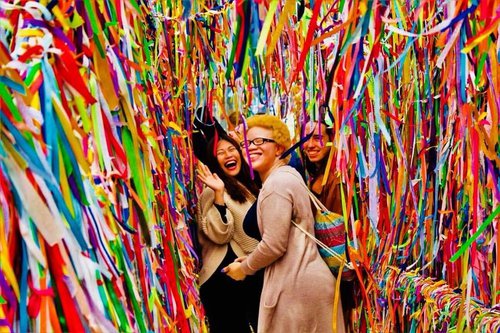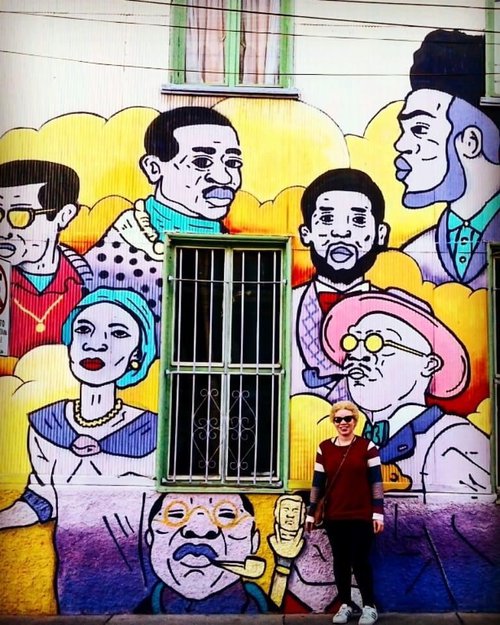Intersectionality: An Account by a Minority Student with a Disability Studying Abroad
Posted on April 29, 2020
I am black-albino, female and visually impaired. Before walking into my first study abroad advising session, I already felt limited in my choices of countries. As an international studies major, I was required to study abroad. I had never traveled out of the country before, nor had any members of my family. I felt anxious, but excited for my first meeting with my advisor.

In the first advising session, we covered basic information and program costs. I felt overwhelmed while she rattled off numbers and fees. Eventually, I chose to study in Chile. The host university had a campus in both Viña Del Mar and Santiago. I Chose Santiago, though I expressed concerns about it only being in its second semester of operation. In response, my advisor assured me the experience would be similar in either location. Subsequent advising sessions remained purely administrative. We worked on booking flights, getting a visa, making payments etc. Only rarely, if I insisted, did we discuss my more personal concerns. Questions such as “will I have accommodations?” or “how do Chileans normally perceive foreigners?” were only briefly addressed. Typical answers were “we’ll see what we can do” and “check online.”
In my pre-departure conference there were very few students (if any) with a similar background to mine going to Chile. I was the only student from my university going to Santiago. Since my advisor told me the programs on both campuses were similar, I felt at ease listening to previous participants share their experience in Vina del Mar. They boasted about the diversity of the students, the caring nature of the professors, and how they bonded well with local students. Still, because of my particular disability and appearance, I felt I had so many questions that they could simply not address. Will signs be large enough for me to read? What was the country's perspective on people of color? Have they ever seen a person with albinism? Would I be ridiculed because of my appearance? I chose not to voice these questions. I felt I must be the only one who had them.
In Chile, I often felt lonely and frustrated. At the host university, professors did not have any knowledge or understanding of accommodations, interacting with local students was difficult due to our isolated schedules and little support existed for helping international students understand the university. On excursions, my inability to participate in activities due to my disability was perceived as lazy or uncooperative. When walking around the city, the pointing, staring and invasive questions began to wear on me after a while. I felt trapped in a bad program at an unsupportive university that seemed to only care that I paid and had proper paperwork. I couldn’t help but question my home university’s motives for partnering with them.
While some aspects of the program, such as assurance of accommodations or the perception of locals, could never be guaranteed or predicted, I feel a lot of the negative experiences I had resulted from the lack of support and communication on behalf of my home university. During the planning process, finances were the dominant aspect of every conversation. This left little time to discuss many other aspects. In country, correspondence remained focused on completing administrative tasks. There was no one to offer mental or emotional support. Returning, I had no place to defrief or further my participation with my program. Unfortunately, my university lacked re-entry or post-program activities. This left me void of any communal space to reflect on my experience as well as a way to help future students in similar situations.

I share this story in an attempt to persuade study abroad advisors, university administration, and students to consider the role that student’s identities could play in their experience abroad. As resources with country-specific information, study abroad advisors can play an important part in preparing students for what they might encounter in another country. Along with university administration, study abroad advisors should also act as advocates for students’ needs and help to ensure that partner institutions are held accountable. Lastly, as the students carrying these identities, it is also important that we advocate for ourselves. We must voice our concerns in order to make the best choices for ourselves, our safety, and our wellbeing. Often, students from diverse backgrounds are still underrepresented in study abroad, thus making our struggles known may help practitioners reconsider how they should approach advising to help better prepare and support us.
Author: Lexus Bivins

Lexus Bivins is a first year Master’s student in International Education at The George Washington University in Washington DC. A graduate of North Carolina State University in May 2019, she earned Bachelors degrees in both International Studies and Spanish Language and Literature. She also completed minors in French and Chinese studies as well as certificate programs for Global Perspectives and Leadership Development. Her research interests include diversity and inclusion in study abroad and students with disabilities in higher education.
